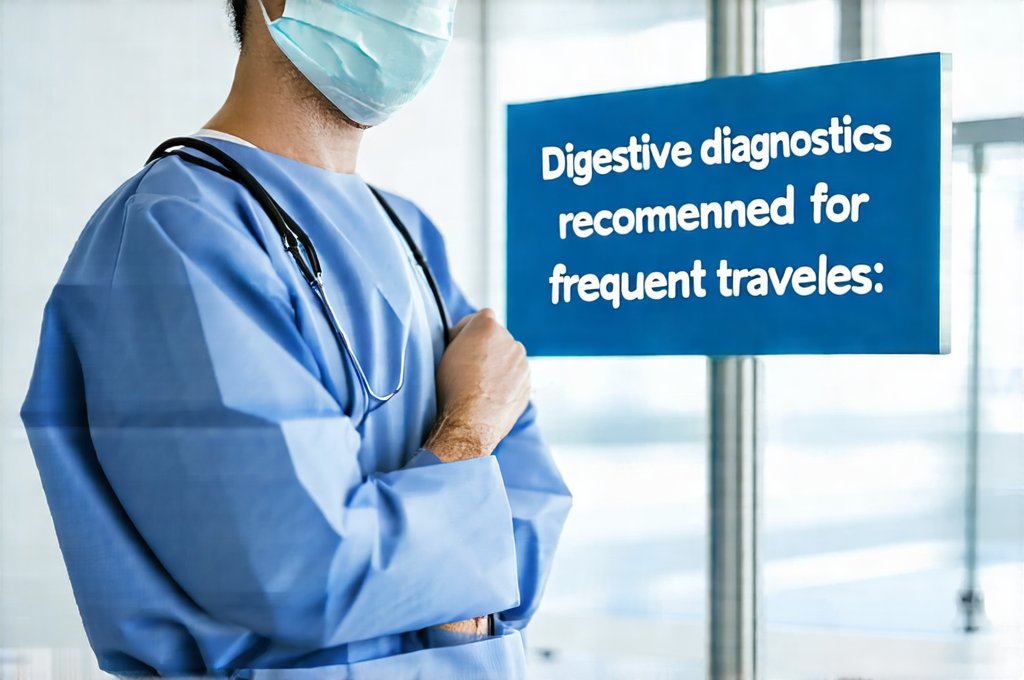Frequent travel, while enriching and exciting, can significantly disrupt our digestive systems. Changes in diet, water sources, time zones, and exposure to different microorganisms create a perfect storm for gastrointestinal distress. Many travelers experience issues ranging from mild bloating and constipation to more serious problems like traveler’s diarrhea or parasitic infections. Proactive digestive health management isn’t about avoiding travel – it’s about minimizing disruptions and ensuring your adventures aren’t sidelined by uncomfortable symptoms. Understanding what diagnostic tools are available, and when they might be beneficial, is a crucial aspect of responsible travel preparation, particularly for individuals with pre-existing conditions or those prone to digestive sensitivities.
This isn’t simply about treating illness after it occurs; preventative diagnostics can help identify potential vulnerabilities and guide personalized strategies to mitigate risks. A thorough assessment before a trip, especially one involving significant geographical shifts or dietary changes, allows travelers to understand their baseline gut health and proactively address any concerns. Post-travel diagnostics are equally important, helping to diagnose persistent symptoms that may indicate an infection or long-term digestive disruption. This article will explore recommended diagnostic tests for frequent travelers, focusing on both pre-trip assessment and post-trip evaluation, offering insights into how these tools can support a healthier travel experience.
Pre-Travel Digestive Assessment
Preparing your gut before you go is arguably as important as addressing issues while traveling or upon return. A pre-travel digestive assessment isn’t about diagnosing a problem – it’s about understanding your individual vulnerabilities and creating a customized plan. This may involve consulting with a healthcare professional specializing in travel medicine or gastroenterology, who can recommend appropriate tests based on your health history, destination, and travel style. The goal is to establish a baseline for comparison should symptoms arise during or after the trip.
A comprehensive assessment often begins with a detailed medical history review, focusing on any pre-existing digestive conditions like Irritable Bowel Syndrome (IBS), Crohn’s disease, ulcerative colitis, or celiac disease. These conditions can be exacerbated by travel and require specific management strategies. Beyond that, looking at dietary habits, allergies, sensitivities, and medication use provides a holistic understanding of your gut health. Several diagnostic tests may then be recommended to further evaluate the digestive system’s functionality.
One common approach is stool testing. This isn’t just for identifying infections; it can also assess parameters like:
– Gut microbiome diversity: A diverse microbiome is generally associated with better overall health and resilience.
– Fecal Calprotectin levels: Elevated levels suggest inflammation in the gut, potentially indicating IBS or IBD.
– Digestive enzyme markers: These reveal how well your body breaks down fats, proteins, and carbohydrates.
Identifying deficiencies or imbalances before travel allows for targeted interventions like probiotic supplementation, dietary adjustments, or enzyme support to optimize digestive function during your trip. Understanding family GI history is also a key component of pre-travel assessment.
Post-Travel Digestive Evaluation
Even with meticulous planning, travelers sometimes experience gastrointestinal issues. While many cases resolve on their own, persistent symptoms – diarrhea lasting more than a few days, severe abdominal pain, fever, bloody stools, or unexplained weight loss – warrant investigation. A post-travel digestive evaluation helps determine the underlying cause and guide appropriate treatment. Ignoring these symptoms can lead to chronic complications or long-term health problems.
The initial step is typically a consultation with a healthcare professional who will review your travel history, symptoms, and any relevant medical background. Based on this assessment, specific diagnostic tests may be ordered. Stool testing again plays a vital role here, but the focus shifts towards identifying pathogens – bacteria, viruses, or parasites – that may have been acquired during your travels. Advanced molecular techniques like PCR (Polymerase Chain Reaction) are often used to detect even small amounts of these pathogens.
Beyond pathogen identification, evaluating for signs of malabsorption is crucial. Travel-related digestive issues can sometimes damage the intestinal lining, leading to impaired nutrient absorption. Blood tests may be ordered to assess vitamin and mineral levels, as well as markers of inflammation and gut permeability (“leaky gut”). In some cases, a colonoscopy or endoscopy might be necessary to visualize the digestive tract and identify any structural abnormalities. Early and accurate diagnosis is key to preventing long-term complications. If you’ve experienced post-infection digestive changes, post-travel evaluation is particularly important.
Identifying the Root Cause: Common Diagnostic Tests
A range of tests can help pinpoint the cause of post-travel digestive issues. Here are some commonly used options:
-
Stool Culture & Analysis: This remains a cornerstone for identifying infectious agents. Traditional stool cultures identify common bacterial pathogens, while more advanced molecular tests like PCR detect a wider range of organisms, including parasites and viruses that might be missed by traditional methods. The analysis also examines the stool’s consistency, presence of blood or mucus, and levels of inflammatory markers.
-
Breath Tests: These non-invasive tests assess carbohydrate malabsorption (lactose intolerance, fructose malabsorption) and Small Intestinal Bacterial Overgrowth (SIBO). They measure hydrogen and methane gas produced by bacteria in the gut after consuming specific sugars. Elevated gas levels indicate a problem with digestion or bacterial imbalance. These are particularly useful for travelers who experienced bloating or excessive gas following certain foods.
-
Blood Tests: Blood tests can provide valuable insights into overall health and digestive function. They may include:
- Complete blood count (CBC) to assess for infection or inflammation.
- Electrolyte levels to evaluate hydration status after diarrhea.
- Vitamin and mineral levels to identify deficiencies caused by malabsorption.
- Celiac disease screening (tissue transglutaminase antibody test) if gluten sensitivity is suspected.
- Markers of intestinal permeability, such as zonulin or lactulose/mannitol ratio, to assess “leaky gut”. Recognizing hidden signs can prompt timely blood testing.
The Role of Endoscopy & Colonoscopy
While less frequently required for routine post-travel digestive issues, endoscopy and colonoscopy become important when symptoms are severe, persistent, or suggest more serious underlying problems.
Endoscopy involves inserting a thin, flexible tube with a camera into the esophagus, stomach, and duodenum to visualize the upper digestive tract. This can help identify inflammation, ulcers, or other abnormalities. Colonoscopy similarly examines the large intestine (colon) using a flexible tube with a camera. These procedures allow for biopsies – small tissue samples – to be taken for further analysis if necessary.
These are more invasive tests and typically reserved for cases where:
– Symptoms persist despite initial investigations.
– There’s suspicion of inflammatory bowel disease (IBD).
– Bloody stools or significant abdominal pain are present.
– Malabsorption is severe, requiring definitive diagnosis of intestinal damage.
Proactive Strategies & Prevention
Ultimately, the best approach to digestive health during travel isn’t just about reacting to problems, but proactively minimizing risks. This includes:
– Staying hydrated: Drink plenty of bottled or purified water throughout your journey.
– Practicing food safety: Choose reputable restaurants and avoid street food vendors if you have concerns. Ensure food is thoroughly cooked and avoid raw produce unless it’s been washed with safe water.
– Building a resilient microbiome: Consider probiotic supplementation before, during, and after travel to support gut health.
– Managing stress: Stress can significantly impact digestion; practice relaxation techniques like meditation or deep breathing exercises.
– Traveling with a “digestive toolkit”: Pack essential medications like anti-diarrheal medication, rehydration salts, and potentially probiotics.
Regular check-ups with your healthcare provider and discussing travel plans are critical steps in ensuring a healthy and enjoyable journey. If you’re a woman experiencing gut changes, proactive diagnostics can be particularly helpful. Remember that these diagnostic tools are best utilized as part of a comprehensive approach to digestive health, tailored to your individual needs and travel circumstances. Understanding silent inflammation can help you make informed decisions about preventative care. Finally, consider diagnostic tests for parasites if your travel destination is known to harbor them and before starting serious medication.


















